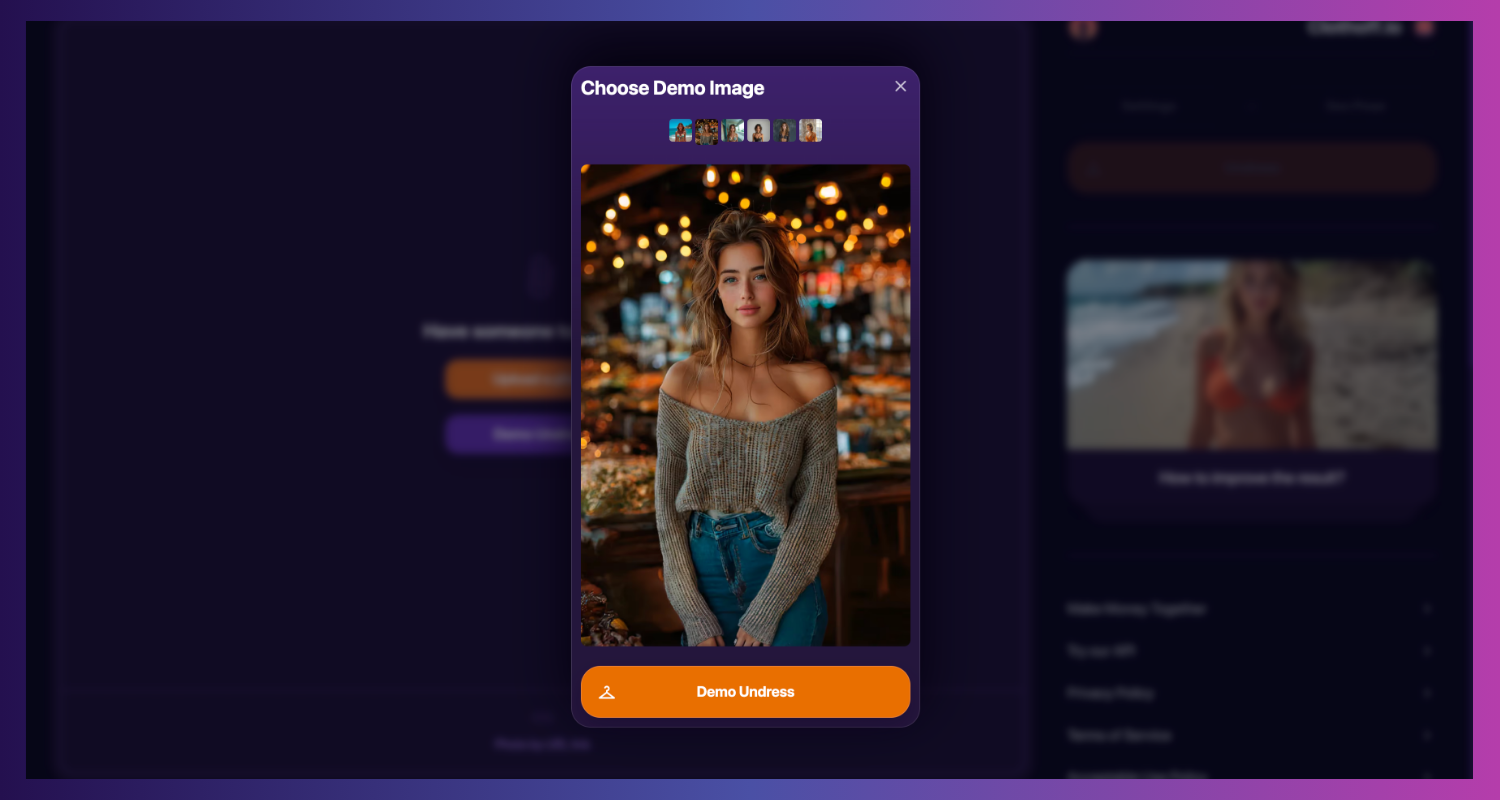Unmasking Clothoff.io: Navigating The Perils Of Deepfake AI
In an increasingly digital world, the line between reality and fabrication blurs, especially with the rapid advancement of artificial intelligence. One controversial application that has garnered significant attention, and concern, is **clothoff.io**. This platform, which openly invites users to "undress" images using AI, represents a troubling frontier in technology, raising serious questions about ethics, legality, and personal safety. While the allure of such tools might seem intriguing, a closer look reveals a landscape fraught with danger, potential legal repercussions, and profound ethical dilemmas.
This comprehensive article aims to dissect the intricacies of clothoff.io, shedding light on its operations, the shadowy figures behind it, and the grave risks it poses to individuals. Drawing insights from reputable investigations, user queries, and legal considerations, we will explore the profound implications of deepfake pornography, the critical importance of digital safety, and the broader societal challenges presented by unchecked AI development. Our goal is to provide a clear, authoritative guide for understanding and navigating the treacherous waters of non-consensual image generation, ensuring readers are equipped with the knowledge to protect themselves and advocate for responsible AI use.
Table of Contents
- Unveiling Clothoff.io: A Deep Dive into Deepfake AI
- The Shadowy Operators Behind Clothoff.io
- Legal and Ethical Quagmire: Is Clothoff.io a Crime?
- Your Digital Safety: Is Signing In or Paying on Clothoff.io Safe?
- Navigating User Concerns: Logging Out and Account Deletion
- The Wider AI Community and Referral Ecosystem
- Protecting Yourself from Malicious AI Applications
- The Guardian's Investigation: A Critical Lens on Clothoff.io
Unveiling Clothoff.io: A Deep Dive into Deepfake AI
At its core, **clothoff.io** is a website that leverages artificial intelligence to create deepfake pornography. Its explicit function, as stated on its own platform, is to "undress" individuals in uploaded images, effectively generating non-consensual intimate imagery (NCII). This technology, while sophisticated, is deployed for a purpose that is both ethically dubious and legally precarious. The sheer scale of its reach is alarming; the website reportedly receives more than 4 million monthly visits, indicating a significant, albeit concerning, demand for such services. The existence of clothoff.io is a stark reminder of how rapidly AI capabilities are advancing, and how easily they can be weaponized. While AI art apps and image manipulation tools have become commonplace, those designed specifically for "nudity" generation cross a critical line. The platform's popularity underscores a disturbing trend where advanced technology is exploited for illicit and harmful purposes, often at the expense of unsuspecting individuals whose images are manipulated without their consent. This intriguing, yet deeply troubling, phenomenon demands a thorough examination of its operational model, its creators, and the broader implications for digital safety and privacy.The Shadowy Operators Behind Clothoff.io
One of the most unsettling aspects of **clothoff.io** is the concerted effort by its operators to remain anonymous. In the year since the app was launched, the people running Clothoff have carefully constructed a veil of secrecy around their identities and operations. This deliberate obfuscation is a significant red flag, undermining any semblance of trustworthiness or accountability. Investigations into the app's financial transactions have revealed the lengths the app’s creators have taken to disguise their identities. Payments to clothoff have been traced, leading to a company registered in London called "Texture." While a registered company might suggest legitimacy, the opaque nature of its connection to clothoff.io and the creators' desire for anonymity raise serious questions about their intentions and the legality of their enterprise. The lack of transparency regarding the names linked to clothoff, the deepfake pornography AI app, is a deliberate tactic to evade scrutiny and potential legal repercussions. This anonymity allows them to operate in the shadows, making it exceedingly difficult for law enforcement or victims to pursue justice. The very act of hiding their identities suggests an awareness of the illicit nature of their service and a calculated attempt to avoid accountability for the harm they facilitate. This absence of a clear, responsible entity behind such a powerful and dangerous tool is a major concern for digital safety advocates and legal authorities worldwide.Legal and Ethical Quagmire: Is Clothoff.io a Crime?
The question of whether using sites like **clothoff.io** constitutes a crime, particularly when involving minors or non-consensual imagery, is not just a matter of legal debate but a fundamental ethical concern. Many users, perhaps out of ignorance or curiosity, find themselves asking, "I messed up by using an AI art app to 'nudity' people, will the developers report me and I face legal actions?" Or, more pointedly, "clothoffなどの服を剥がすサイトありますがそれで未成年者にやったら犯罪になりますか? これが犯罪じゃなかったら世界は終わりです" (If sites like Clothoff that strip clothes are not a crime when used on minors, then the world is over). This sentiment powerfully encapsulates the public's intuitive understanding of the severe harm involved. The answer is unequivocally yes: creating and disseminating non-consensual intimate imagery (NCII), including deepfake pornography, is a serious crime in many jurisdictions globally. Laws are rapidly evolving to address this new form of digital sexual abuse. Using AI to "undress" someone without their explicit consent, regardless of their age, is a violation of their privacy and dignity, and can lead to severe legal consequences for the perpetrator, including imprisonment and hefty fines. When the victim is a minor, the offense escalates to child sexual abuse material (CSAM), carrying even more stringent penalties. The developers of such platforms, while often hiding behind layers of anonymity, are also subject to legal action if their operations are found to be illegal. The very nature of clothoff.io, designed to generate such content, places it squarely in a legal grey area that is increasingly being defined as criminal.The Perils of Non-Consensual Imagery
The creation and distribution of non-consensual intimate imagery, whether real or deepfaked, inflicts profound and lasting harm on victims. The psychological impact can be devastating, leading to severe emotional distress, anxiety, depression, and even suicidal ideation. Victims often experience public humiliation, damage to their reputation, and professional setbacks. Unlike traditional forms of abuse, digital content can spread rapidly and persist indefinitely online, making it incredibly difficult to remove and allowing the trauma to be re-lived repeatedly. Globally, legal frameworks are being strengthened to combat this menace. Countries like the UK, various states in the US, and nations across the EU have enacted or are in the process of enacting laws specifically targeting deepfake pornography and NCII. These laws often categorize such acts as sexual offenses, recognizing the severe violation of autonomy and consent. The legal consequences for individuals who create, share, or even possess such content can range from significant fines to lengthy prison sentences, depending on the jurisdiction and the specifics of the case, especially if minors are involved.AI Ethics and Developer Responsibility
The rise of AI-powered tools like **clothoff.io** brings into sharp focus the critical issue of AI ethics and the responsibility of developers. While some porn-generating AI websites out there right now, from what is known, very strictly prevent the AI from generating an image if it likely contains child sexual abuse material or other illegal content, clothoff.io appears to operate with far fewer, if any, such safeguards. This stark contrast highlights a significant ethical failing. Responsible AI development demands that creators prioritize user safety, privacy, and societal well-being over profit or convenience. Developers have a moral and ethical obligation to implement robust safeguards, content moderation, and legal compliance mechanisms to prevent their technology from being misused for harmful purposes. This includes actively filtering out illegal content, preventing the creation of NCII, and ensuring that their platforms do not become conduits for digital abuse. The lack of such measures on platforms like clothoff.io is not merely an oversight; it represents a deliberate choice to ignore the potential for profound harm, making the developers complicit in the misuse of their technology. As AI becomes more powerful, the imperative for ethical guidelines and developer accountability becomes ever more pressing.Your Digital Safety: Is Signing In or Paying on Clothoff.io Safe?
A common concern among individuals who have encountered or considered using **clothoff.io** revolves around personal digital safety. Questions such as "clothoff.ioというサイトにappでサインインをしてしまったのですが、危険ですか? またiPhoneの設定からサインインを解除したのですがその場合は大丈夫ですか?" (I signed into clothoff.io with an app, is it dangerous? And if I revoke the sign-in from iPhone settings, is that okay?) and "clothoff.io←このサイトって写真流失する可能性はありますか? また、Eメールアドレスでログインしたのですが、危険ですか?" (Is there a possibility of photo leakage from clothoff.io? And is it dangerous if I logged in with my email address?) highlight legitimate fears about data privacy and security. The consensus from digital security experts and those with a "grandparent's concern" (老婆心ながらアクセスし) is clear: **clothoff.io** is not a safe site to access. Any interaction with such a platform, including signing in with an email address or through a third-party app, carries inherent risks. There is a significant possibility of your personal data, including email addresses and uploaded photos, being compromised or leaked. These sites often lack robust security protocols, making them vulnerable to data breaches. Even if a user claims, "私や知り合いなどで課金しましたが特に何も変化ございません。不安に思うようでしたらしない事をお勧めします" (My acquaintances and I paid, and nothing in particular changed. If you're worried, I recommend not doing it), the absence of an immediate negative consequence does not equate to safety. Payment information, even if seemingly secure in the short term, could be at risk of future breaches. The very nature of the service—dealing with sensitive images and operating in a legally ambiguous space—means it is unlikely to prioritize user data security. Therefore, it is strongly advisable to avoid signing in, uploading photos, or making any payments on clothoff.io.Navigating User Concerns: Logging Out and Account Deletion
For those who have already interacted with **clothoff.io** and are now concerned about their digital footprint, the immediate questions often turn to how to minimize potential harm. Queries like "Clothoff.ioのログアウト方法とアカウント削除方法を教えてください" (Please tell me how to log out of Clothoff.io and how to delete my account) are common. Unfortunately, given the opaque nature of such platforms, a straightforward and guaranteed method for complete data removal is often elusive. While you might be able to find a "logout" button on the website, or revoke app permissions through your device settings (e.g., iPhone settings), this does not guarantee that your data has been permanently deleted from their servers. Many illicit or ethically questionable sites are designed to retain data, which could be used for various purposes, including future exploitation or sale. If you have signed in with an email address, it's advisable to change that email's password immediately and enable two-factor authentication if you haven't already. If you used a unique password for clothoff.io, ensure it's not used anywhere else. For any third-party app permissions granted, revoke them through your device's privacy settings. While a full account deletion might not be verifiable, taking these steps can help mitigate some risks associated with data retention and unauthorized access. The best defense, however, remains prevention: avoiding such sites altogether.The Wider AI Community and Referral Ecosystem
The existence of **clothoff.io** cannot be viewed in isolation; it operates within a broader, rapidly expanding ecosystem of AI tools and online communities. Platforms like r/referralswaps, the 37k subscribers in the telegrambots community, and the massive 1.2 million subscribers in the characterai community demonstrate the widespread interest in AI applications. These communities often serve as hubs where users share their telegram bots, discover bots other people have made, and post referrals to help out others. While many of these communities and AI tools are legitimate and foster innovation, they also inadvertently create an environment where problematic applications like clothoff.io can gain traction. The openness of these platforms, which encourage users to "post your referrals and help out others," can sometimes be exploited by malicious actors. This underscores the critical importance of community guidelines that explicitly state, "Please do not post any scams or misleading ads (report it if you encounter one)." The decentralized nature of these communities means that users must exercise extreme caution and critical judgment when encountering new AI tools, especially those that promise to deliver controversial or ethically questionable results. The shared responsibility to "remember to not upvote any posts to ensure it" (presumably, harmful or misleading ones) is vital in self-regulating these digital spaces and preventing the proliferation of dangerous content.Protecting Yourself from Malicious AI Applications
In an era where AI is becoming increasingly pervasive, understanding how to protect yourself from malicious applications like **clothoff.io** is paramount. The first and most crucial step is prevention: avoid engaging with websites or applications that promise to generate non-consensual imagery or operate in a legally dubious manner. Always scrutinize the legitimacy of a website before providing any personal information, uploading images, or making payments. Look for clear contact information, transparent privacy policies, and a track record of ethical operation. Educate yourself and others about the dangers of deepfake technology and the severe legal and personal consequences of creating or sharing non-consensual content. Be wary of unsolicited links, suspicious ads, or offers for "free coins" on questionable platforms, as these often lead to scams or expose you to greater risks. If you encounter content generated by clothoff.io or similar tools, do not share it. Instead, report it to the relevant platforms and authorities. Your digital well-being, and that of others, depends on informed choices and responsible online behavior.Reporting and Legal Recourse
If you or someone you know has been a victim of non-consensual intimate imagery, whether created by **clothoff.io** or other means, it is crucial to know that you have options for reporting and legal recourse. Do not hesitate to contact law enforcement agencies in your jurisdiction. Many countries have specialized units dedicated to cybercrime and child protection that can assist. Additionally, report the content to the platform where it is hosted (e.g., social media sites, image boards), as they often have policies against such material. Organizations like the National Center for Missing and Exploited Children (NCMEC) in the US, or similar bodies internationally, provide resources and support for victims of online child sexual abuse material. Legal professionals specializing in cyber law can also offer guidance on pursuing civil action against perpetrators or platforms. While the process can be challenging, taking action is vital not only for your own healing but also to hold offenders accountable and deter future crimes.The Future of AI and Digital Responsibility
The proliferation of tools like **clothoff.io** serves as a stark warning about the potential dark side of unchecked technological advancement. As AI continues to evolve, its capabilities will only grow, making it imperative for society to establish robust ethical frameworks and legal guidelines. The future of AI hinges not just on what technology can do, but on what we, as a society, permit it to do. This includes advocating for stricter regulations on AI development, promoting digital literacy, and fostering a culture of consent and respect in online interactions. The responsibility extends beyond developers to include policymakers, educators, and individual users. We must collectively demand transparency from AI companies, support legislation that protects individuals from digital harm, and empower users to make informed decisions about their online behavior. The battle against malicious AI applications is not merely a technical one; it is a societal challenge that requires a unified commitment to digital responsibility and the protection of fundamental human rights in the digital age.The Guardian's Investigation: A Critical Lens on Clothoff.io
The concerning activities of **clothoff.io** have not gone unnoticed by investigative journalism. Excerpts from a linked investigation by The Guardian provide a critical lens on the deepfake pornography AI app, further solidifying the concerns surrounding its operations. The Guardian's reporting highlights the lengths to which the app's creators have gone to maintain anonymity, making it difficult to trace their identities and hold them accountable. This journalistic scrutiny is vital in unmasking the individuals and entities behind such harmful platforms, providing authoritative insights that corroborate the risks discussed throughout this article. The investigation likely delved into the technical infrastructure, financial flows, and the identities (or lack thereof) of the individuals profiting from this illicit service. Such in-depth reporting by a reputable news organization like The Guardian lends significant weight to the claims of danger and illegality associated with clothoff.io. It underscores that the concerns are not merely speculative but are grounded in concrete findings, further emphasizing the lack of trustworthiness and the inherent risks of engaging with such a platform. The Guardian's work serves as a powerful reminder of the importance of independent journalism in holding powerful, yet shadowy, digital entities accountable for their actions and their impact on society.In conclusion, while the allure of advanced AI technology can be captivating, platforms like **clothoff.io** represent a dangerous frontier that prioritizes illicit gratification over ethical considerations, legal boundaries, and personal safety. The ability to generate non-consensual intimate imagery, coupled with the shadowy operations of its creators, poses significant risks to privacy, reputation, and emotional well-being. The legal implications for both creators and users are severe and evolving, reflecting a global consensus that such acts are deeply harmful and criminal.
We urge all readers to exercise extreme caution in the digital realm. Prioritize your digital safety by avoiding suspicious websites, never uploading personal images to unverified platforms, and being vigilant about the information you share online. Educate yourself and others about the dangers of deepfake technology and the importance of digital consent. If you or someone you know has been affected by non-consensual imagery, seek help from law enforcement and support organizations. By staying informed, advocating for responsible AI development, and upholding ethical digital practices, we can collectively work towards a safer and more respectful online environment. Share this article to help spread awareness and protect others from the perils of malicious AI applications.

Clothoff.io Review, Pricing, Features and Alternatives - April 2024

Deep Nude AI Free Trial Clothoff.io

Clothoff.io – Remoção de Roupas no iOS, Android e Web